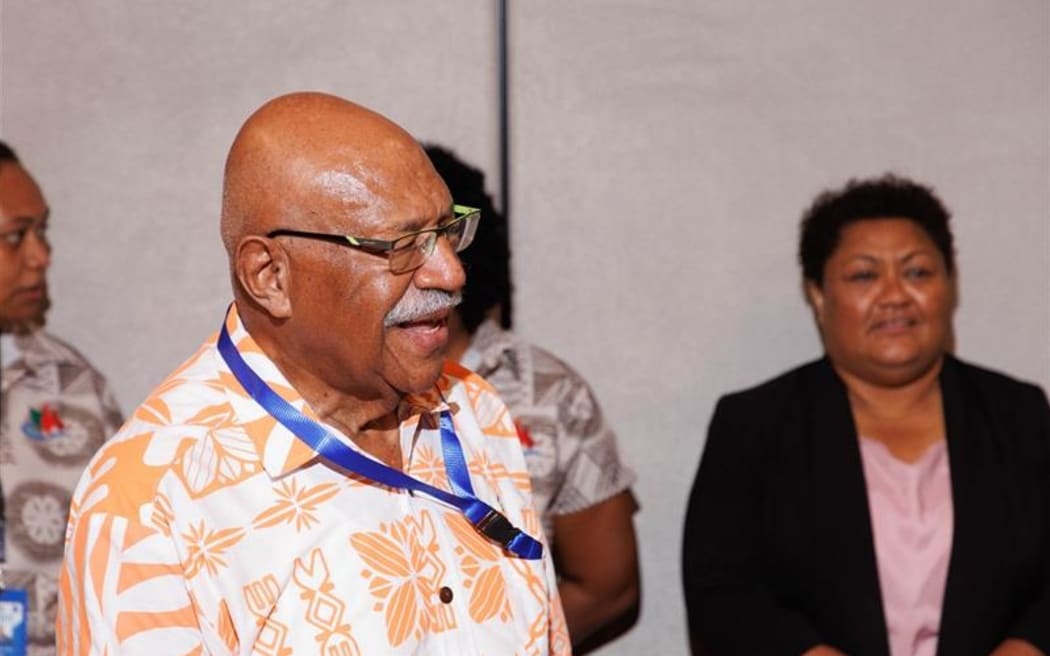The Office of the Director of Public Prosecutions will not lay charges against Fiji Prime Minister Sitiveni Rabuka and former prime minister Voreqe Bainimarama for allegedly urging political violence and urging communal antagonism.
The two cases were among a list of other high profile cases which the DPP’s office confirmed would not lay any charges.
In a statement today, acting Director of Public Prosecutions David Toganivalu listed the high profile cases:
*Sitiveni Rabuka and Sakiasi Ditoka – urging political violence and inciting communal antagonism
* Voreqe Bainimarama – urging political violence and inciting communal antagonism
*Methodist President Ili Vunisuwai and Waisale Tikowale – urging political violence and inciting communal antagonism
*Opposition MP Mosese Bulitavu – causing harm through electronic communication
The police files for the suspects were sent to the DPP for an assessment of the evidence and a decision on whether any charges should be laid following the complaints.
Toganivalu said after a review of the police docket and the evidence, it was their opinion that there was insufficient evidence to support any criminal charges against the suspects in their respective matters.
He said the docket had been returned to police with the instructions not to charge and no further action required.
Meanwhile, the Human Rights and Anti-Discrimination Commission has expressed concern over recent reports of the treatment of certain accused persons by the Fiji Police Force.
HRADC chair Pravesh Sharma said the Police should treat all accused persons in the same manner irrespective of their ethnicity, gender, political or partisan affiliations, race, and social status/background.
“The Commission acknowledges that Police are empowered to receive complaints, investigate, interview, arrest and charge persons; however, in carrying out such functions, the Police have to ensure that the rights of accused persons are respected and complied with.”
He said while the Police are entitled to detain persons for 48 hours, they should try to process accused persons within a reasonable time.
“If possible, the practice of taking accused persons into custody on Friday afternoons and the weekends should be avoided, since access to private lawyers and the Courts are limited during the weekends.”
“Ideally, the Police should carry out and complete their investigations before taking accused persons into custody for caution interviews.”
“The purpose of caution interviews is not only to enable the Police to obtain relevant evidence to strengthen the prosecution case; but also to permit the accused persons to provide their alibis or explanations.”
“The Police should investigate the alibis or explanations before proceeding to charge accused persons.”
“During a caution interview, if an accused person only agrees to provide his or her name and address, and thereafter exercises his or her right to remain silent, the Police should respect that right and terminate the interview and not continue to put questions to the accused person.”
“If a caution interview continues beyond one day, the accused person should be permitted to go home and return the next day for the continuation of the interview unless the Police have a good reason to keep the accused in remand overnight, in which case proper facilities such as a separate cell, bed, clean linen, bathroom, toilet and meals should be provided.”
Sharma said for appropriate offences, Police officers should exercise their discretion and release charged persons on Police Bail to enable them to attend Court at a later date.
“Pursuant to the Bail Act 2002, for a person charged with an offence but yet to be convicted of it, there is a presumption in favour of bail, unless there are good reasons for it to be refused.”
“At all times, the Police should comply with the Rule of Law,” he said.
Home Affairs Minister Pio Tikoduadua has called for a review of the country’s Police Standing Orders, describing them as “vague”.
Tikoduadua criticiSed the lack of definition for serious crimes and the treatment of high-interest persons, leaving interpretation subjectively in the hands of police.
He stated that such ambiguity could have detrimental effects on decision-making, especially in changing environments.
The minister’s comments came in response to questions about the recent arrest of former Attorney-General Aiyaz Sayed-Khaiyum.
“As I have stated before, I take responsibility, as minister for the actions of the agencies under my ministry. However, Police Commanders and legislators must make clear laws and standard operating procedures where the police officer’s discretion is guided by a process and not to exercise discretion subjectively.”
Tikoduadua also addressed concerns over why Sayed-Khaiyum was handcuffed, citing section 46 of the Police Standing Orders Act.
“Male prisoners under arrest for serious offences shall always be handcuffed when under escort. When Sayed-Khaiyum was transferred from CID to Totogo. He was under escort. In addition for his own safety and because of his medical condition, Sayed-Khaiyum was not placed in the cell at Totogo. He spent the night at the Totogo Police Station’s common holding area.”
Tikodudua reiterates that he does not interfere with police investigations.
SOURCE: FIJI TIMES/FIJI LIVE/FBC NEWS/PACNEWS














